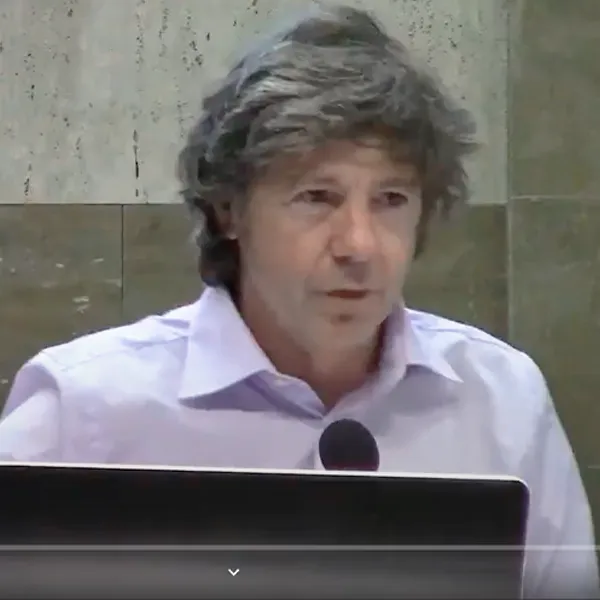Then in 1923, a young Adolf Hitler staged his own coup d’état that also failed. Ten years later, Hitler came into power with the help of Germany’s conservatives via parliament. Around that time, some of Noske’s free corps started to move into Hitler’s SA and SS.
Róża Luksemburg or Rosa Luxemburg was born 150 years ago on 5th March 1871. On the evening of 15th January 1919, Karl Liebknecht and Rosa Luxemburg were seriously beaten and then shot. Liebknecht, who was declared as an unknown corpse, was found close to a lifeguard station. The unconscious body of Rosa Luxemburg< was put into a car where she was shot, and her dead body was thrown from the Lichtenstein Bridge into the Landwehr Canal. Their killers were members of a pre-Nazi militia death squad called Guard Cavalry Riflemen Division. The counter-revolutionary platoon had taken up quarters at the Berlin >Hotel Eden on Kurfürstendamm, known as Budapester Straße 35, today.
Ten years later, the Berliner Volkszeitung wrote
the Noske system wanted to defend the freedom of the young republic with the Landsknechten of the old army. A terrible mistake! Rosa Luxemburg and Karl Liebknecht were the first to be murdered by those violent people, but not the only ones.
The Noske system referred to the right-wing social-democrat, Gustav Noske, who was not only famous for his statement – someone has to be the <bloodhound, but for also hiring ex-soldiers as mercenaries called >Freicorps< or free corps, at the end of World War I. During the German Revolution of 1918–1919, their task was to eliminate Germany’s revolutionary workers. Noske’s private killing squad shot workers to secure capitalism’s survival which was threatened by The Revolution. Noske and the social-democratic right literally killed the German Revolution of 1918–1919 and paved the way for capitalism supported by parliamentarian democracy.
However, a few years later, the free corps staged its first major coup d’état known as Kapp Putsch. Some of the free corps painted white swastikas on steel helmets – a sign of white terror. Their <>coup d’état was directed against those who had earlier called upon them to help kill workers to end the revolution, but it failed.
But before all that, the former lover of Rosa Luxemburg, Leo Jogiches, published a detailed article in the “Rote Fahne” (the red flag) describing Rosa’s killers as right-wing mercenaries who “meticulously planned and executed” her. Her death was followed by a social-democratic cover-up to hide the role of the official authorities, Friedrich Ebert’s social-democratic government and the Noske’s. On 10th March 1919, Jogiches was arrested and executed.
Not much later, Julius Gumbel started to research political murders in post-WWI Germany and found that from 1918 to 1922, the left murdered 22 people leading to ten arrests and 38 convictions. Meanwhile, Germany’s radical right murdered 354 people in the same time frame, but there were only 24 arrests, and in 23 cases, the courts acquitted the confessed perpetrators. In short, Germany’s radical right killed 16-times as many people and got away with it.
In other words, Germany’s right-wing court system supported right-wing violence, brutality, mass killings and politically motivated assassinations targeting trade unionists, progressives, democrats, etc. This set up a devastating pattern for decades to come – leniency towards right-wing extremists and harsh treatment of progressives. Not much later, many of the progressives were killed in concentration camps.
Rosa Luxemburg was born in Zamosc – southeastern Poland. Her medieval hometown was named after Polish magnate Jan Zamoyski (1542-1605), who had studied in Padua, Italy. Upon returning to Poland, he brought an architect from Venice to build an ideal Polish city, and Rosa Luxemburg was born into his 16th-century utopian creation. However, being born in a utopian town had little to do with Rosa Luxemburg’s fight for a utopian society because when she was two years old, her family moved to Warsaw.
Following that, Rosa and her family left Poland for the German city of Frankfurt am Main. Although Rosa has a long line of Jewish scholars in her family, she never mentioned them. Rosa also hated anti-Semitism but remained reserved about her Jewishness. She wrote, what do you want me to do with this Jewish pain? The poor victims of the rubber plantations in Putumayo, the Negroes in Africa … they are just as close to me. I have no special home in my heart for the ghetto. I feel at home all over the world, where there are clouds and birds and human tears. During Rosa’s time, the word “ghetto” did not signify the ghettos that the Nazis created.
Today, Rosa’s hometown is listed as a UNESCO world heritage site because it is a unique example of a Renaissance town. Perhaps the town symbolizes Rosa Luxemburg’s political-philosophical attitude towards a socialist utopia that defined her political and intellectual life. Still, Rosa Luxemburg moved – like almost all radical thinkers between 1848 and 1918 – between reform and revolution, between masses of workers and a vanguard party and between means (revolution) and ends (socialism).
These concepts and political realities marked out Rosa’s magnetic field that determined so much of her life and thinking. Inside these, her life, philosophy, writings and politics unfolded. She took a stand against the idea that an elite could start a revolution. Instead, she believed that a revolution could only be the achievement of masses of workers who had become self-confident and self-aware of their class and capitalism.
Rosa Luxemburg inscribed two small books – Letters From Prison and Junius Theses. From the Breslau Prison, in December 1917, Rosa wrote, Rosa lived for the revolution, the opportunity to put an end to oppression and exploitation. On 12th May 1917, Rosa wrote while still in prison, so I am in my prison cell walled in from all sides. Rosa’s courage to share thoughts makes her Letters From Prison a masterpiece of materialistic mysticism – one of the most extraordinary texts in world literature.
In the second book, Junius Theses, Rosa says, World War I has destroyed the forty years of work for European socialism. Socialism was not destroyed from the outside by a greater power, but it was blown up from within. Rosa argued that the main task of the current situation is
to combine the proletariat of all countries into a living revolutionary power, to make it, through a strong international organization with a uniform conception of its interests and tasks, with uniform tactics and political capacity for action in peace as well as in war, the decisive factor of political life … to that role it is called by history.
This statement sums up Rosa Luxemburg in one sentence. Her keen view of the world as it is and her ability to make this the basis of her political action could have been astonishing if it were not so destructive. The forces of the counter-revolution were set upon her by Germany’s mighty social-democratic government during 1918/19.nbsp;
This is precisely why Rosa Junius Thesesis so important. It shows someone who acts as if she is holding onto something that has been knocked out of her hand a long time ago. In a way, Rosa’s writing is a tragic testament of the hopes and aspirations of Germany’s revolutionary working class. Meanwhile, the reformist forces of social democracy betrayed the revolution setting the course towards parliamentarian democracy that was flanked by capitalism. And within twenty-free years, these dark forces mutated into German Nazism – a counter-revolution that gathered speed during the final period of the Weimar Republic.
Yet, the masses on which Rosa relied so strongly still had plenty of possibilities to understand the world. Many workers understood their situation better than ever before. But they didn’t know what to do with the power they were holding during a brief moment of history. This was the power of the revolution during the winter of 1918/19. Looking back on the years before Nazism,Bertolt Brechtwrote in 1934 on the rise of Germanic fascism, who would have thought that this [i.e. Nazism] would come so soon… how can [the Nazis] be stopped? Stalingrad during winter 1942/43 when a victorious Red Army marked the beginning of the end of Hitler’s fascism.
Brecht himself answered in the following line of his text, for the vanquished of today are the victors of tomorrow. Many of Brecht’s vanquished had indeed vanquished. Some on Hitler’s battlefields< and in concentration camps. Yet, there was a tomorrow. Just as the KZ song sung by KZ inmates says…
ewig kann nicht Winter sein [winter can’t last forever]
Eventually, winter ended, and the forces against Nazism were victorious. For those liberated at Auschwitz, it was the Red Army leading them out of German concentration camps and into paradise.
Long before the Red Army liberated Auschwitz, Rosa Luxemburg’s spoke so eloquently of the revolutionary proletariat during the winter of 1918/19. For Rosa, it was the revolutionary proletariat that saved humanity. Yet, Rosa’s revolutionary proletariat only ever existed as a small group. Still, it came to hold power during those few months at the end of WWI when Germany came close to a victorious revolution. Unfortunately, Rosa had overestimated the power of Marxist theory and the power of her revolutionary working class. For Rosa, the German Revolution of 1918–1919 should have made up for the previously failed revolution – The Revolution of 1848
Rosa’s 1918/19 revolution marked a second great uprising within one hundred years. For Rosa Luxemburg, such revolutions, revolts and rebellions were nothing new. Three centuries earlier, German peasants had rebelled during what became known as the Peasant War. The peasant revolution with Thomas Müntzer at the helm, in the year 1525, challenged feudal authorities and led to his murder in Germany. In 1525, 1848 and 1918/19, German peasants and workers revolted, and although their failures were repeated, they moved on. The mass of workers on which Rosa relied and without conscious participation could not imagine a revolution that lies dormant today.
The robust arguments Rosa Luxemburg developed throughout her life took place among friends. They were intellectually stimulating as well as relentless. With her best friends, the Kautsky’s, she quarrelled over the role of mass strikes. With her former life partner, Leo Jogiches, who threatened to beat her to death or shoot her, Rosa continued to cooperate politically. An undeterred Rosa Luxemburg thought, spoke and wrote about socialism or barbarism and the fact that freedom is always the freedom of those who think differently – there was no retreat.
Perhaps it is part of Rosa Luxemburg’s misfortune that she rushed into the revisionism dispute and the debate on mass strikes. In any case, it is our misfortune too. Her seductive intelligence and the sharpness of her mind still lure new generations worldwide into intellectual hunting grounds of an unfinished revolution as well as the nightmare that follows.
Rosa felt at home all over the world – and nowhere. Perhaps, the utopia of a better society was one of her homes. Today, we can look back at Rosa Luxemburg’socialism or barbarism and see that 150 years after her birth, we are still at the gateway of socialism or barbarism.
Today’s barbarism no longer means revisionist social-democrats. It no longer means Gustav Noske’s death squads. Today, barbarism means something much more lethal – capitalism. Capitalism has moved all of us ever closer to the abyss – the end of humanity. One hundred fifty years after Rosa Luxemburg’s birth, we have a new >barbarism – The Uninhabitable Earth, which has been inflicted upon us.










